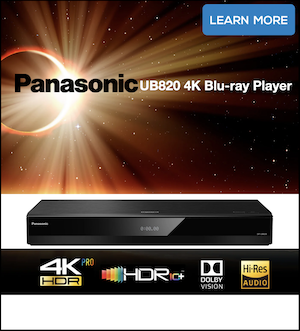More
- Preamp, Processor or Receiver
- Yamaha TRS-7850 Atmos Receiver
- Other Amp
- Peavy IPR 3000 for subs
- Universal / Blu-ray / CD Player
- Panasonic UB820 4K UHD Player
- Front Speakers
- Cheap Thrills Mains
- Center Channel Speaker
- Cheap Thrills Center
- Surround Speakers
- Volt 10 Surrounds
- Surround Back Speakers
- Volt 10 Rear Surrounds
- Rear Height Speakers
- Volt 6 Overheads
- Subwoofers
- 2x Marty subs (full size with SI 18's)
- Video Display Device
- Sony 85 inch X950H FALD TV
Glass

Movie:
4K Video:
Video:
Audio:
Extras:
Final Score:
Movie:

4K Video:

Video:

Audio:

Extras:

Final Score:

We are literally living in a golden age of comic book movies right now. Superhero films have long since been a part of cinematic culture (some good, some horrible), but the last decade has blended the advances of modern technology with the acceptance of nerd culture into pop culture to literally bring us a glut of superhero films. DC and Marvel are duking it out for king of the castle in the big leagues, but there are a few superhero films that slide behind the scenes, and nothing is more insidiously covert as M. Night Shama-lama-ding-dong’s Unbreakable trilogy. I’m not officially sure that M. Night ever intended for his turn of the century film to be the start of a trilogy, but that’s what it has turned into. Back in the day M. Night Shyamalan was putting out some fantastic thrillers. Signs, Unbreakable, The Sixth Sense, and even The Village were hailed as awesome flicks, but then he suddenly went off the rails. The king of pulling the rug out from underneath the viewers basically tanked himself with one box office bomb after the other (The Happening is one of the most horrific bits of his history, and is a movie that I actually bring to bad movie nights to make of religiously), but somehow he still got studio backing. I will admit that I really liked 2006’s Lady in the Water (it’s not a traditional M. Night Shyamalan movie), but post 2006 the man was a pariah in the film industry. He made movie after movie that bombed epically, and I had come to the conclusion that the man was a one trick pony. His cool tricks had been used up in earlier films and all that was left was a shell of a director desperately trying to relive his glory days. Then came the 2016 film Split.
Split was almost a horror/thriller movie, and one that put M. Night Shyamalan back on the map theatrically. It was an honestly GOOD film that was enhanced by James McAvoy’s brilliant performance of a man with split personality disorder who kidnapped unsuspecting girls and then murdered them. However (spoilers ahead for those who haven’t seen Split, sorry but it can’t be hidden in order to talk about Glass), the movie side lined viewers when the ending of the movie comes to fruition and you realize that Split is within the Unbreakable universe as we see the unbreakable man himself, David Dunn (Bruce Willis), getting ready to hunt the beast down. While it’s not a traditional sequel to Unbreakable, it is more of a sidequel that takes place in the same universe. As big as Split was for the nearly sidelined director, it also meant that an actual sequel was greenlit by Universal Studios in the blink of an eye, and Glass was fast tracked to complete the story.
A true sequel to both films, Glass brings the world of Unbreakable and Split together for the first time in it’s true form. The Horde (what the split personality form of Kevin Crumb, played magnificently by James McAvoy) is out capturing young girls again, but this time he’s got the Overseer on his trail (the name that Bruce Willis’s David Dunn takes on for his invincible superhero persona) and is closing in on him. In an epic superhero style battle the two duke it out in an abandoned warehouse only to be capture by the police and put under the evaluation of psychiatrist Ellie Staple (Sarah Paulson), who firmly believes that the two of them have mental delusions of grandeur. Trapping them in rooms that exploit the men’s weaknesses, she dissects and probes into their brains in an effort to get the men to accept the reality that they are nothing truly special. The only thing is, She also has the elusively brilliant Elijah Price (e.g., Mr. Glass, with Samuel L. Jackson also reprising his role), who has a few tricks up his sleeve.
Glass seems to be more straight forward for the first two acts. The previous two movies always had you second guessing whether David Dunn or The Horde were actually imbued with powers. There were some nutting scenarios, but they always left you with this niggling doubt that maybe there was some rational explanation for it all. Could David Dunn’s belief in himself and his invulnerability be what makes him special? Is The Horde truly capable of a beast form? Or is it simple mental illness combined with a very strong man? It gave the viewers so much to digest and wonder about that the lack of answers almost makes the films so much fun to chew through. The “maybe it is, maybe it isn’t?!” tactic Shyamalan used was incredibly effective and fantastic to watch. Glass takes that approach one more, but it starts having you question BOTH sides of the fence as the first act shows the two super powered men squaring off in what SEEMS to be a battle for the ages, but is then drug back into question zones as Dr. Staple begins to psychologically break down the men. But no matter her attempts, this one heavily paints their abilities (including Mr. Glass’s) as something more. The audience KNOWS that these men are what super heroes were based upon. However, even though it’s a bit straight forward, it’s that third act with the twist that makes it all worth while, and once again shows us that Glass and Shyamalan himself was keeping a few things close to the vest.
While Shyamalan is great, what really makes the film WORK is the performances. Bruce Willis has been in an acting coma for the last 10 years (ish), and it’s fantastic to see him actually act and be the man he once was on screen. Samuel L. Jackson is hamming it up as the maniacal Mr. Glass like always, and McAvoy is stunning as the constantly shifting personalities of The Horde. My only complaint is the inclusion of Anya Taylor-Joy’s Casey (the victim who got away in Split), as she seemed less vital to the story than anyone else. It’s a minor quibble among a sea of very good performances, but a quibble nonetheless.
Rating:
Rated PG-13 for violence including some bloody images, thematic elements, and language
4K Video:
 Video:
Video: 
Audio:

Extras:

- David Dunn
- Elijah Price
- Kevin Wendell Crumb
- The Rest of the Family
• Bringing the Team Back Together - M. Night Shyamalan is famous for working with many of the same crew from film to film. In this piece, cast and crew share personal stories of why Shyamalan's productions feel like seeing family again.
• David Dunn vs. The Beast - An in-depth look at the animalistic face-off between David Dunn and The Beast
• Glass Decoded - M. Night Shyamalan unveils some secrets of continuity and style from across the Glass trilogy
• Breaking Glass: The Stunts - The superhuman strength of The Beast is best illustrated in the stunts. Take a behind the scenes look into the very effective methods of executing stunts in the film.
• Connecting the Glass Universe - Explore M. Night Shyamalan's stylistic approach to the Glass trilogy and the unconventional concept of a comic book movie grounded in reality.
• M. Night Shyamalan: Behind the Lens - Cast and crew discuss Shyamalan's dedicated and meticulous approach to storytelling.
• The Sound of Glass - Composer West Dylan Thordson elaborates on his use of string instruments to create tension, and explains why recording the score on-location enhanced the tone of Glass.
• Enhancing the Spectacle - The VFX team provides details on the rewarding task of using CGI as an effective tool to intensify the narrative of Glass.
• Raven Hill Memorial - Roam the long corridors of Raven Hill Memorial Hospital and see why the cast and crew describe the eerie location as its own character in the film.
• Night Vision - A look at the early stages of Glass by examining the storyboards and their remarkable similarity to the final shots in the film.
Exclusive to 4K and Blu-ray
• Alternate Opening - Introduction by director M. Night Shyamalan available
• Deleted Scenes - Introductions by director M. Night Shyamalan available
- David Alone at Bar
- Patricia Talks to Cheerleaders
- David Encounters Pierce
- Casey in Art Class
- Dr. Staple Explains Machine
- Mrs. Price in Waiting Room
- Mrs. Price Talks to Elijah
- Dr. Staple Drinks Tea
- Pierce Checks Elijah's Room
- Mrs. Price Tells Elijah About Surgery
- David Submits to Dr. Staple
- Patients Worship The Beast
• A Conversation with James McAvoy and M. Night Shyamalan - Star James McAvoy and Producer/Writer/Director M. Night Shyamalan discuss the importance of originality when creating a film in this genre.
Final Score: 

Glass is probably the weakest of the trilogy, but it is only in minor bits, as it is near the quality that the excellent Split was. Unbreakable is still one of his crowning jewels and the best non mainstream superhero film of the early 2000’s in my opinion, but Glass is a VERY VERY solid rounding out of the trilogy. It brings the creepy horror/thriller of Split in with the fun super hero/thriller nature of Unbreakable and blends them together much more in line with Unbreakable at the end of the day. The audio and video scores are fantastic in both 4K UHD and Blu-ray, and the extras more than ample, allowing me to give two thumbs up and recommend Glass very highly to people who have enjoyed the first two films.
Technical Specifications:
Starring: Samuel L. Jackson, Sarah Paulson, M. Night Shyamalan, Bruce Willis, James McAvoy, Anya Taylor-Joy, Spencer Treat Clark, Luke Kirby
Directed by: M. Night Shyamalan
Written by: M. Night Shyamalan
Aspect Ratio: 2.39:1 HEVC
Audio: English: Dolby Atmos (Dolby TrueHD 7.1 Core), French (Canada), Spanish DD 5.1
Subtitles: English SDH, French, Spanish
Studio: Universal
Rated: PG-13
Runtime: 129 Minutes
Blu-ray Release Date: April 16th, 2019
Recommendation: Highly Recommended













